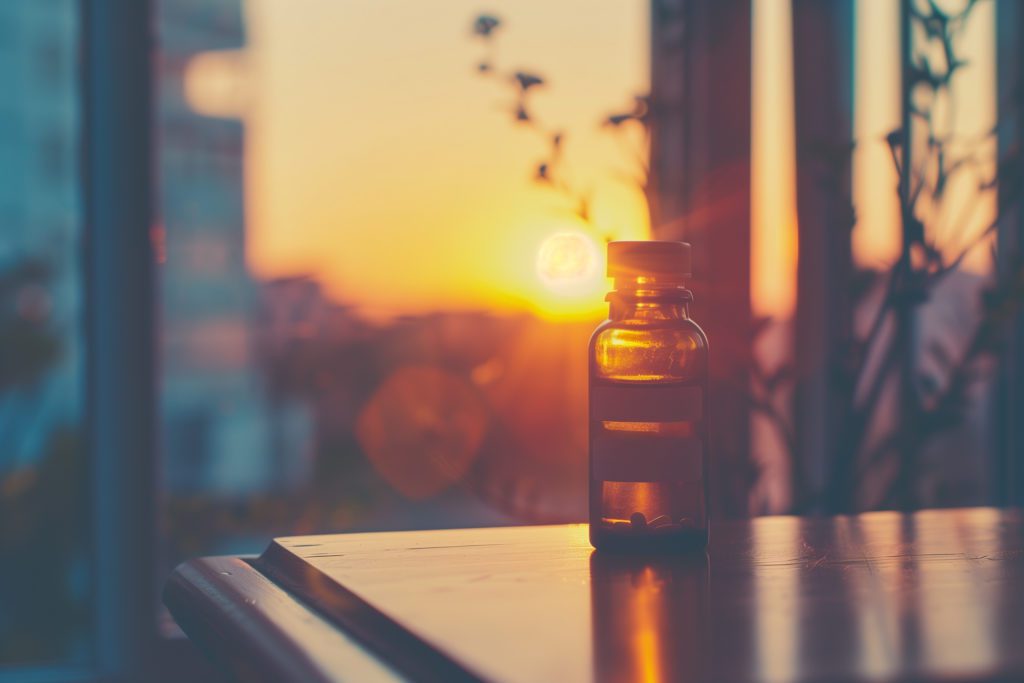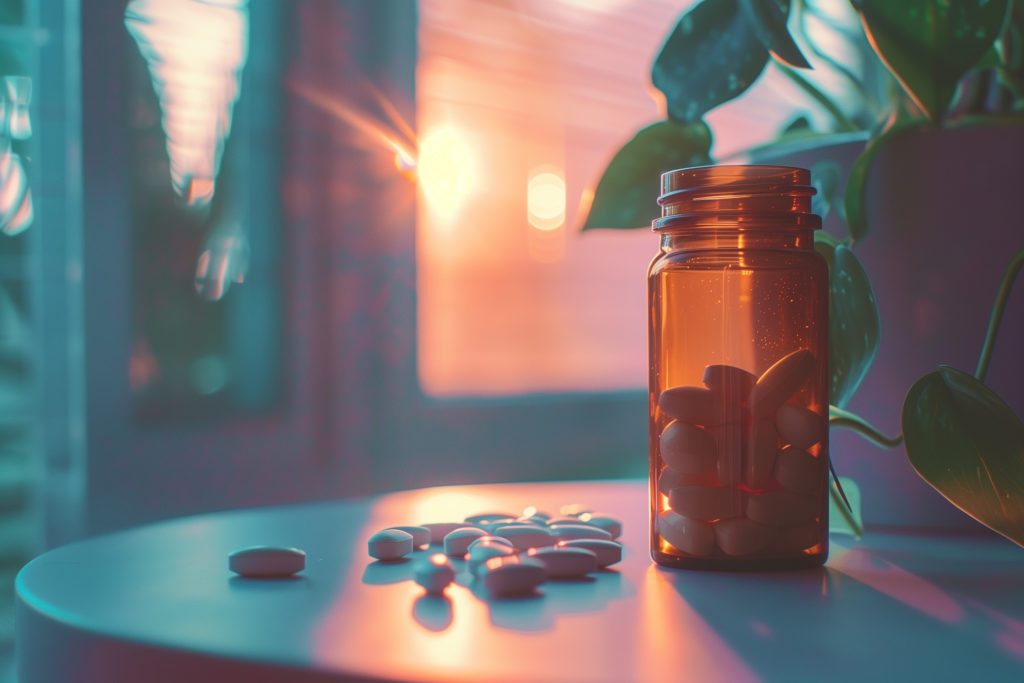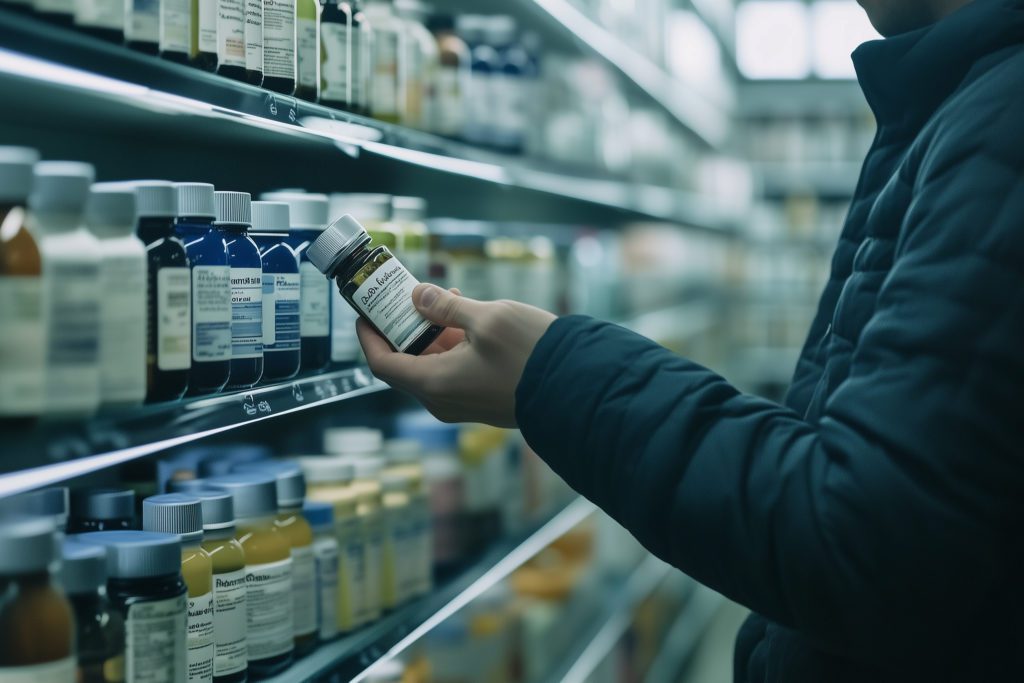
How Melatonin Affects Your Sleep - What You Must Know
Many people think of melatonin as a readily available, over the counter supplement that can help them get to sleep, sort of like a natural sleeping pill.

But melatonin is far, far more powerful than just an ordinary supplement, and is almost completely misunderstood by the majority of people who casually add a bottle of it to their shopping cart in the hopes it will help them get a good night’s rest. To understand melatonin’s effects on sleep, as well as your other bodily systems, you need a better appreciation of this somewhat mysterious compound, sometimes called the “vampire” hormone.
Melatonin, contrary to what most people believe, is not a simple supplement, but is a potent hormone naturally produced by your pineal gland, a tiny organ that sits deep in the center of your brain. Hormones are your body’s messenger molecules, as they are made in one location, then travel to other parts of your body to help control various functions of cells and organs.
Your pineal gland’s primary function is to produce the hormone melatonin in response to the daily cycle of light and dark in your environment. This information is conveyed to the pineal via photoreceptors in your eyes that send this data in the form of nerve impulses to a structure in your brain known as the SCN or supra-chiasmatic nucleus. The SCN serves as the master clock for all of your body’s 24-hour circadian rhythms, and it then relays this information on to the pineal gland.
Production
Once melatonin is produced, it’s released from the pineal into the bloodstream, and also into the spinal fluid that surrounds your brain and spinal cord, where it then travels to distant organs. Melatonin is very sensitive to levels of light and darkness, as bright light suppresses its secretion and darkness enhances it. Your body’s level of melatonin starts to rise about two hours prior to bedtime as natural light begins to diminish (thus the vampire reference!) and reaches its peak concentration between 2 and 4 am. After that, melatonin levels begin to decrease, and continue to fall to very low levels during the day, until the pineal receives the signal to once more begin production.
The exact reasons melatonin causes you to feel sleepy is currently a topic of scientific investigation, but research points to multiple biological pathways. Melatonin itself does not directly cause you to fall asleep, but seems to enhance a state of quiet wakefulness that assists in facilitating sleep. In the morning, as your eyes are exposed to light, the remaining melatonin in your bloodstream fades even further, as the hormone is very sensitive to increasing light levels. Then, as darkness falls again, the level of melatonin begins to rise once more, and the cycle continues.
How can knowing how melatonin works help you get better sleep?
There are times when you may want to consider taking a melatonin supplement and those will be considered in a moment, but fortunately, most people produce enough melatonin naturally. There are several simple and effective ways to enhance your natural melatonin production without having to resort to taking it in tablet form.
One of the most effective ways to enhance your natural melatonin production is to limit your exposure to bright light in the evening, especially the blue light wavelengths emitted by computer screens, tablets, other electronic devices, and the LED lights which illuminate your home, that can destroy melatonin and play havoc with your sleep. As dusk approaches, dim the lights in your house or switch to a red light bulb for evening, and ideally shut off your computer, smartphone and other screens for the evening. In addition, you can also purchase blue blocking glasses to use when working on your computer in the evening.
Another way to enhance production of melatonin is to expose your eyes to natural light first thing in the morning. This sets your brain’s master biological clock in the SCN for the day, and besides helping to regulate all of your cells’ body clocks, it signals your pineal gland that the day/night cycle has begun again. Exposure to natural light early in the morning has been shown to have a positive effect on mood and also helps you sleep better that night. If you can, go outside for a few minutes again during the afternoon without sunglasses to again signal the time to your master body clock, and to help program your pineal gland to produce melatonin at the right time of day.
Although the melatonin content of foods is not commonly listed, there are six foods that are relatively high in their melatonin content, and may also help to enhance your sleep. These foods are tart cherries, goji berries, eggs, milk, oily fish such as salmon, and nuts. Keep in mind that cherry juice is high in sugar, so the whole fruit is better to consume. Warm milk is a traditional bedtime drink if you tolerate dairy. As for nuts, all contain melatonin but pistachios have the most.
When should you consider taking a melatonin supplement?
As you age, melatonin levels begin to decline, so that by the time you are 70 years old your nighttime melatonin levels are just twenty-five percent or less of the melatonin produced by a younger adult. The shorter days of winter can also disrupt melatonin production, as can stress, shift work and smoking. Add these to the almost constant exposure from electronic screens to melatonin-destroying blue light, it’s no wonder so many people suffer from occasional or even frequent insomnia.
Melatonin supplements, which are synthetically produced, are likely safe for the occasional sleepless night, but should not be used for chronic insomnia, as there is sparse evidence for their effectiveness in this condition. Melatonin supplementation can be helpful if you are suffering from jet lag, as it has been shown to help shift you back into a normal sleep pattern. In patients trying to sleep prior to surgery, melatonin has also been shown to be helpful.
There are some disorders characterized by disruptions in sleep in which melatonin has been shown to be effective. These are, in adults, delayed sleep-wake phase disorder, in which people stay awake till very early in the morning and then sleep till mid-day. In children, there are specific conditions that can disrupt sleep and melatonin may help. These are autism spectrum disorder, attention-deficit hyperactivity disorder, asthma, and certain kinds of dermatitis. Keep in mind that because melatonin is a hormone, you should not give it to a child without a physician’s supervision.
How much melatonin should you take, and when?
Although melatonin can be readily purchased over the counter and online in strengths varying from 3 milligrams up to a whopping 60 milligrams and more, in this case, less is better. Tablets are not your only choice, as there are also gummies, liquid preparations, and even oral sprays.
For occasional problems either getting to sleep or staying asleep, take 1 to 3 milligrams (mg), two hours before bedtime. After a week or two, if melatonin does not seem to be helping, then discontinue it, and talk with your healthcare provider. If it does help, then it’s safe for most people to continue taking it for a month or two, at which time it should be discontinued and your sleep reevaluated. For help with jet lag, take melatonin beginning a few days prior to your trip, 1 to 3 milligrams before the time you would go to bed at your destination. If you work a night shift and want to use melatonin to help you sleep when you get off work, take it at the end of your shift. Wait until you get home to take it though, and never drive after you have taken melatonin.
Melatonin is a powerful, naturally produced hormone. Augmenting your natural levels is an excellent way to improve your sleep and should be considered as a first step. If you must take a melatonin supplement, start with the lowest effective dose, and don’t continue it for more than a couple of months. Used judiciously, melatonin can be very effective.
FAQ
Can melatonin interact with medications?
Yes, melatonin can interact with medications such as blood thinners, antidepressants, immunosuppressants, and diabetes medications. It may enhance or counteract their effects, so it's important to consult a healthcare provider before using melatonin supplements.
Is melatonin safe for long-term use?
Long-term use of melatonin is not well studied. While short-term use is generally considered safe, prolonged use may affect natural hormone production and circadian rhythms. Experts recommend using it for a few months and then reassessing sleep patterns.
Does melatonin have side effects?
Can melatonin help with conditions other than sleep disorders?
Melatonin has been studied for its potential benefits in conditions such as seasonal affective disorder (SAD), migraines, and immune system regulation. However, more research is needed to confirm its effectiveness beyond sleep-related issues.
What is the best time to take melatonin?
The optimal time to take melatonin is about 30 minutes to an hour before bedtime. This allows the supplement to align with the body's natural sleep-wake cycle. Taking it too early or too late can disrupt circadian rhythms rather than improve them.
How does melatonin compare to other sleep aids?
Unlike prescription sleep medications, melatonin is a hormone that helps regulate sleep naturally without causing significant dependency. However, it may not be as effective for severe insomnia, where stronger medications might be required.
Can melatonin affect hormone levels in the body?
Since melatonin is a hormone, excessive use may interfere with other hormones such as estrogen and testosterone, potentially impacting reproductive health and metabolism over time.
References
- Costello, R. B., Lentino, C. V., Boyd, C. C., O'Connell, M. L., Crawford, C. C., Sprengel, M. L., & Deuster, P. A. (2014). The effectiveness of melatonin for promoting healthy sleep: a rapid evidence assessment of the literature. Nutrition journal, 13, 106.
https://doi.org/10.1186/1475-2891-13-106 - Aulinas A. Physiology of the Pineal Gland and Melatonin. [Updated 2019 Dec 10]. In: Feingold KR, Anawalt B, Boyce A, et al., editors. Endotext [Internet]. South Dartmouth (MA): MDText.com, Inc.; 2000-. Available from:
https://www.ncbi.nlm.nih.gov/sites/books/NBK550972/ - Savage RA, Zafar N, Yohannan S, Miller JMM. Melatonin. In: StatPearls. StatPearls Publishing, Treasure Island (FL); 2021. PMID: 30521244.
- Rossignol, D. A., & Frye, R. E. (2014). Melatonin in autism spectrum disorders. Current clinical pharmacology, 9(4), 326–334.
https://doi.org/10.2174/15748847113086660072 - Esposito, S., Laino, D., D’Alonzo, R. et al. Pediatric sleep disturbances and treatment with melatonin. J Transl Med 17, 77 (2019).
https://doi.org/10.1186/s12967-019-1835-1 - Howatson, G., Bell, P. G., Tallent, J., Middleton, B., McHugh, M. P., & Ellis, J. (2012). Effect of tart cherry juice (Prunus cerasus) on melatonin levels and enhanced sleep quality. European journal of nutrition, 51(8), 909–916.
https://doi.org/10.1007/s00394-011-0263-7 - Pereira, N., Naufel, M. F., Ribeiro, E. B., Tufik, S., & Hachul, H. (2020). Influence of Dietary Sources of Melatonin on Sleep Quality: A Review. Journal of food science, 85(1), 5–13.
https://doi.org/10.1111/1750-3841.14952 - Kozaki, T., Kubokawa, A., Taketomi, R. et al. Effects of day-time exposure to different light intensities on light-induced melatonin suppression at night. J Physiol Anthropol 34, 27 (2015).
https://doi.org/10.1186/s40101-015-0067-1

Written by
Sue Ellen Brit
A cross-disciplinary, innovative thinker and writer, I pull from a deep well of academic subject expertise, including medicine, education, biology, natural resources and psychology.
Download Pillow
Get help
Press & News
Legal
Connect
X (Twitter)
Company
Copyright © Neybox Digital Ltd.



